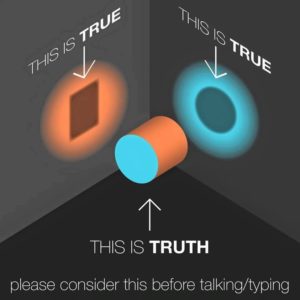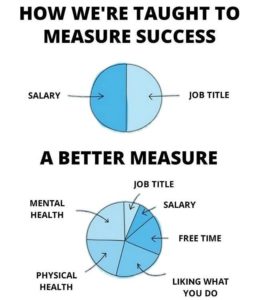We are being bombarded by messages … some even creep into our overnight sleeping hours. Everyone seems to want us to either agree with or learn something they think we currently “don’t get” as fully s they do. Part of me at my age just wants to shut them out as whiny brats, but I know that will not help. The feisty side of me wants to try to offer them another perspective so they can see that their perspective may be coloring their views. Something we should all be more aware of.

This graphic has been circulating on the internet for a while and probably suffices in and of itself to convey the message. Depending upon how you shine a light on an idea, you can get quite different images of truth. As I have gotten older I have seen popular opinions of truths change. At one time in my past it was a sign of failure for a husband to have his wife working. He clearly was an inadequate provider if that was true.
Attitudes toward women have been in dramatic transition with work still needed today to be sure they are safe and offered the best in opportunities for their futures. Similar arguments for progress extend of course to numerous others in our society. And, I am proud to be an American where we can freely work towards these goals … but we should also recognize that transitions like this are not easy nor quick. Frankly, you have to let generations pass so that some of the bad attitudes of the past can purge themselves naturally from society.
There are some who have no sense of history here and want to mandate this or that. I would hope they have learned from the COVID-19 pandemic that there are portions of society who will use the possibly rightful attempt to control others as a perfect reason to reject their authority and fight their ideas.
We all agree that we need to heal some of the polarities in our society but few seem to have the grace and temerity to be healing agents. Rather, we seem to be in a war within our own country to win at our specific agendas rather than to truly understand each other and find higher … not common ground.
This graphic illustrates that principle. I don’t know who to thank for it, but I do thank whomever.


 question in the title to this blog says it all in my opinion. I saw this image posted on LinkedIn with an invitation for anyone to comment.
question in the title to this blog says it all in my opinion. I saw this image posted on LinkedIn with an invitation for anyone to comment.
 questions you ask are managed using artificial intelligence, kind of like what happens when you talk to today’s smart speakers like Alexa. Most of us find these comfortable and acceptable, except that lately Alexa has been engaging me with follow up suggestions after I ask a question. This brings do mind some of the online spoofs where Alexa reminds the person they shouldn’t be buying that item given their health status.
questions you ask are managed using artificial intelligence, kind of like what happens when you talk to today’s smart speakers like Alexa. Most of us find these comfortable and acceptable, except that lately Alexa has been engaging me with follow up suggestions after I ask a question. This brings do mind some of the online spoofs where Alexa reminds the person they shouldn’t be buying that item given their health status.
